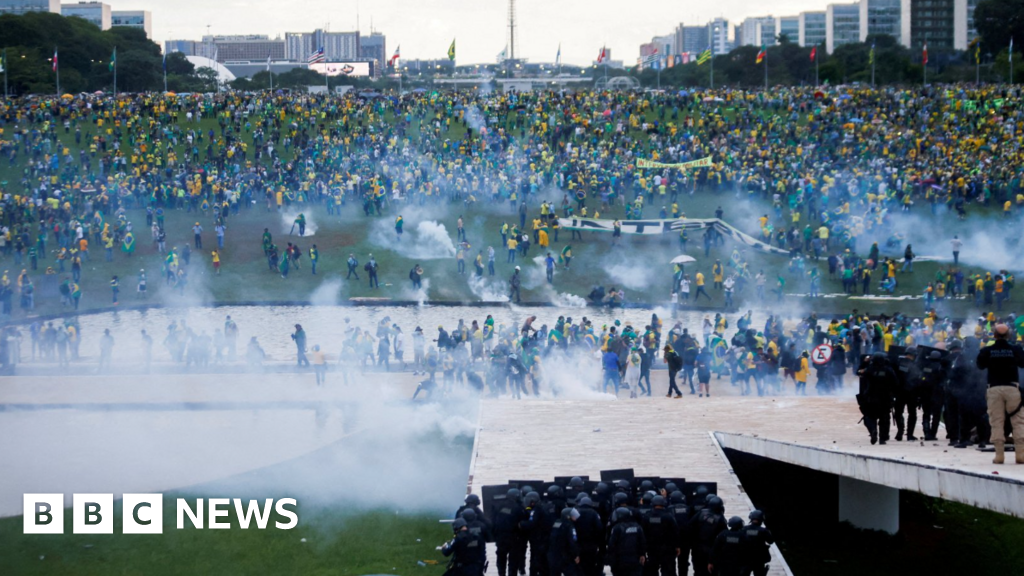ARTICLE AD BOX
Watch footage from the scene where just a burnt out shell remained of the bus
The survivors of a bus inferno that killed at least 46 people scrambled to safety through a window after the vehicle caught fire and crashed in Bulgaria, officials say.
Seven people escaped with burns from the vehicle, which was packed with tourists who were mostly Macedonian.
The bus slammed into a barrier and went up in flames while returning from Istanbul in Turkey to North Macedonia.
Twelve children were among the dead, including twin boys, aged four.
Only four men and three women survived the disaster, which happened on a motorway south-west of the Bulgarian capital, Sofia, early on Tuesday.
The scale of the loss has caused shock and grief in Bulgaria and North Macedonia, where three days of national mourning have been declared.
Macedonian Prime Minister Zoran Zaev described the crash as "horrifying".
"I met the injured in a hospital in Bulgaria. My heart broke when I was hearing the cry of a father who lost [his] child," Mr Zaev told the BBC.
The PM said he had spoken to one of the survivors, who told him that passengers were asleep when the sound of an explosion woke them.
"They succeeded in breaking one of the windows and saved a few people. Unfortunately, the rest did not succeed," Mr Zaev told reporters.
The cause of the disaster was not immediately clear. Bulgarian officials said the bus swerved off the motorway and tore away a 50m (164ft) section of the crash barrier.
But it is not yet known if the bus caught fire before or after the crash. No other vehicles were involved in the accident.
Image source, EPA
Image caption,Part of the motorway barrier was destroyed in the crash
Pictures of the aftermath showed a section of the road where the crash barrier had been shorn off and the charred bus, gutted by the fire.
The mayor of the nearby village of Pernik said the motorway was in poor condition on that section and there were often accidents in the area.
The bus had been returning to the capital of North Macedonia, Skopje, from a weekend holiday trip to Istanbul.
It was apparently travelling as part of a convoy of four buses and had stopped at a petrol station near Sofia about an hour before the accident. The other buses, which were a few minutes ahead, returned to North Macedonia safely.
A painful loss of life for Macedonians
Saska Cvetkovska for BBC News in Skopje, North Macedonia
On social media and elsewhere, reactions to this tragedy have been similar: this should not have happened.
Too many people die in road accidents every year in North Macedonia.
In February 2019, 15 people were killed and more than 30 were badly injured when a bus carrying workers to the Macedonian capital crashed.
The accident gained a lot of political attention and the government led by Prime Minister Zoran Zaev promised to review the way transport firms were licensed. When the news of Tuesday's accident broke, many Macedonians expressed outrage and disappointment.
Many feel those promises to keep people safe on the roads haven't been kept. Nikola Atanasovski lost a cousin in the 2019 bus crash.
"This morning, all I could think was, 'of course this has happened again'. But it should not. I feel angry," he told me.
In 2019, many people blamed the authorities. This feels different though.
In a country where so many people see their future abroad, it's particularly painful to lose so many young lives.
Macedonians feel they cannot afford to lose any life. Today, we lost nearly 50 people.
The victims have not yet been officially named, but officials said they included 12 children, and many young people aged between 20 and 30.
One man told the Sloboden Pecat newspaper that 10 of his relatives had died in the disaster.
"I lost my whole family in the blaze," the man was quoted as saying.
Five pupils at a primary school in Skopje and a young couple who were due to be married were also among the dead, Macedonian media said.
Macedonian reports said 27-year old Gazmend Ukali and Albina Beluli, 23, from the north-western town of Tetovo, had gone to Istanbul to celebrate Ukali's birthday.
Albania's foreign minister indicated that most, if not all, the passengers were ethnic Albanians from North Macedonia.
Image source, Reuters
Image caption,Relatives of passengers injured in the crash had gathered outside the hospital in Sofia
Adnan Yasharovski said his 16-year-old daughter Zuleikha called him to say she had survived the crash. Mr Yasharovski told Reuters news agency he went to Sofia to see her in hospital.
"She was crying. Her hands were burnt but otherwise fine," he said, outside the hospital. "She didn't say much, she was crying and she was in shock."
The bus belonged to Besa Trans, a travel company that organises trips in Europe.
Within hours of the crash, relatives of people who travelled to Turkey with Besa Trans last week gathered outside the firm's office in Skopje, anxiously looking for information.
Bulgaria's interim Prime Minister Stefan Yanev described the incident as "an enormous tragedy".
"Let's hope we learn lessons from this tragic incident and we can prevent such incidents in the future," he told reporters as he visited the crash site.
Investigative service chief Borislav Sarafov said "human error by the driver or a technical malfunction are the two initial versions for the accident".
Mr Sarafov told reporters that it appeared both drivers had been killed in the crash so no one was able to open the doors.
Have you have been affected by the issues in this story? Email haveyoursay@bbc.co.uk.
Please include a contact number if you are willing to speak to a BBC journalist. You can also get in touch in the following ways:
If you are reading this page and can't see the form you will need to visit the mobile version of the BBC website to submit your question or comment or you can email us at HaveYourSay@bbc.co.uk. Please include your name, age and location with any submission.

 2 years ago
169
2 years ago
169








 English (US)
English (US)